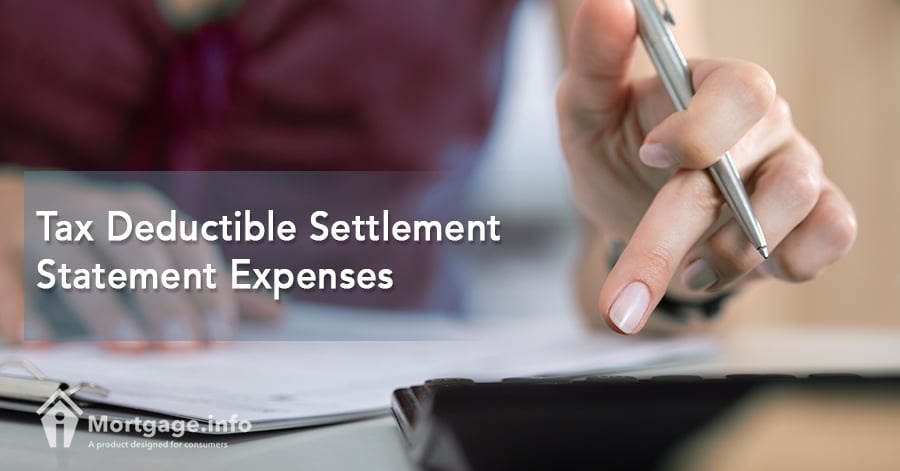Whether you refinance a mortgage or buy a new home with your mortgage, you’ll pay fees. Luckily, many of those fees on your settlement statement provide you with tax deductions. Knowing which expenses you can write off and which you cannot may help you negotiate the best terms for your loan.
Looking for Current Mortgage Interest Rates? Click Here.
Origination Points
It’s not unusual to pay origination points on a mortgage. Whether you have a less than perfect credit score or have a unique situation, lenders often charge points up front. Sometimes, those points are in place of itemized closing costs and other times they are in addition to the costs.
Whatever the case may be, you may be able to deduct those points on your tax return. Lenders look at points as prepaid interest. Since you get to deduct the interest you pay on your mortgage on an annual basis, it makes sense that you can deduct the points.
The type of loan will determine how you can deduct the points:
- If you purchased a home, you can deduct the full amount of the points during the year that you paid them
- If you refinanced a mortgage, you must prorate the points over the term of the loan. For example, if you took out at 15-year loan, you’d write off a portion of the points every year for 15 years.
Discount Points
Discount points are different than origination points. These are points you pay in exchange for a lower interest rate. Again, it’s like prepaid interest. It’s how the lender makes money on your loan.
Click to See the Latest Mortgage Rates.
Discount points look the same as the origination points. They are a percentage of your loan amount. One point equals one percent of your loan. On a $100,000 loan, one point equals $1,000. You can deduct these points on your tax returns. Again, you can deduct the full amount of the points on a purchase. If you refinanced, you’ll prorate the deduction over the life of the loan.
Escrow Payments
Setting up an escrow often means paying real estate taxes upfront. It pays to know exactly how much you paid towards your real estate taxes at the closing. These funds are tax deductible, just like the real estate taxes you pay directly to the county. You cannot, however, deduct the homeowner’s insurance premiums you pay upfront, so you’ll need to differentiate from the two.
Make sure to ask your lender how much of the escrow account that you set up is comprised of real estate taxes. This way you know exactly how much you can claim on your taxes for deductions.
Prepaid Interest
Any interest you pay at the time of the closing can also be deducted. You prepay interest because you will not owe a mortgage payment the next month. Let’s say you close on November 15th. You would not make a mortgage payment until January 1st. This leaves all of the interest for the rest of November to be paid. The mortgage payment you make in January will cover December’s interest, though. If you close early in the month, you could pay a decent amount of money for interest that is worth deducting on your taxes.
Settlement Statement Items You Can’t Deduct
Of course, your settlement statement is comprised of more than interest, points, and real estate taxes. Unfortunately, most of the other items are not tax deductible.
Specifically, you cannot deduct:
- Fees for an appraisal
- Fees to hire an attorney
- Costs for the home inspection
- Homeowner’s insurance premiums
- Credit report fees
- Record fees
- Tax service fees
These are standard fees you pay for a loan closing that you cannot deduct. Essentially, you can only deduct the fees that have to do with prepaid interest or real estate taxes. Anything else is a cost you must bear and should take into consideration when buying or refinancing.
Most importantly, all of these deductions only apply to a primary residence. In some cases, you can deduct items for a second home; however, you must prove you are not renting it out and making an income. Talk to your tax advisor about the items you can deduct to see if it makes sense to itemize your deductions or take the standard deduction this year.

